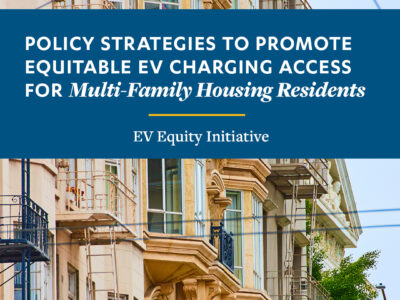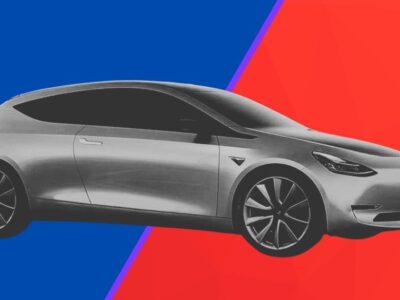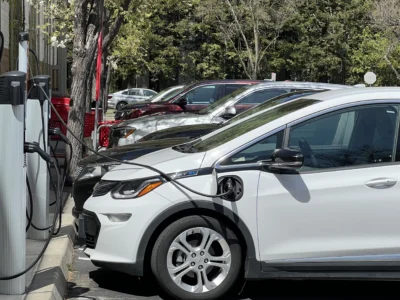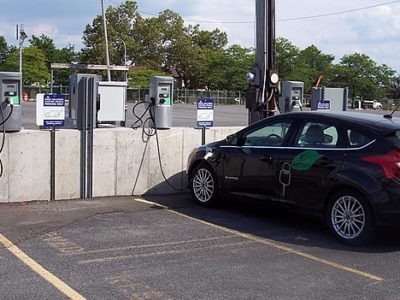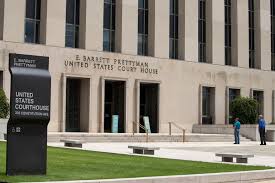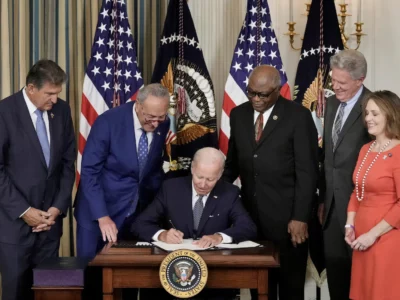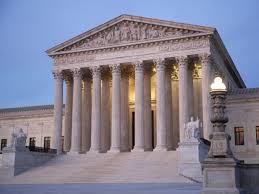electric vehicles
EV Charging Access for Multifamily Housing Residents
New CLEE report highlights key findings for equity-oriented program design
The rapidly approaching electric vehicle (EV) transition that California and a dozen other states have committed to enact over the coming decade mounts pressure on state and local governments to deliver millions of new EV chargers across various location types. Homes constitute the core of a convenient and reliable charging network, and EV charging infrastructure …
Continue reading “EV Charging Access for Multifamily Housing Residents”
CONTINUE READINGBattery Technology and EVs Take Off: A Timeline
These interlinked technologies are crucial to the energy transition. Here’s their history.
To fight global warming, we need to largely eliminate the internal combustion engine as a form of transportation. We need battery technology for this and to store electricity, because wind and solar power are intermittent. These technologies didn’t appear out of thin air. Here’s the story of their rise
CONTINUE READINGClimate Policy and the Audacity of Hope
The barriers are still huge — but we can also envision a path to success.
We should resist the allure of easy optimism about climate change, given the scale of the challenges. Neither should we wallow in despair. There’s a good basis for hope. Let’s seize the day!
CONTINUE READINGNo, EVs are Not Worse for the Planet
There’s an electric car culture war raging. It doesn’t hurt to say obvious things, like that electric cars reduce driving costs and pollute far less than gas-powered cars.
If you have somehow managed to escape the frenzied political headlines about electric vehicles, first I envy you and second, I must regrettably inform you that the EV has become an acronym of partisan rancor on par with IVF, DEI, and CRT. There’s a lot of reasons for this electric car culture war: President Biden …
Continue reading “No, EVs are Not Worse for the Planet”
CONTINUE READINGThe New EPA Car Rule Doesn’t Violate the Major Questions Doctrine
They both relate to climate, but West Virginia v. EPA involved a very different regulation raising very different issues.
In West Virginia v. EPA, the Supreme Court struck down the Obama-era Clean Power Plan. The heart of the ruling was that EPA had engaged in a power grab, basing an unprecedented expansion of its regulatory authority on an obscure provision of the statute. Conservative groups have claimed since then that virtually every government regulation …
Continue reading “The New EPA Car Rule Doesn’t Violate the Major Questions Doctrine”
CONTINUE READINGFour EV Trends
One of these things is not like the others.
The automotive world is changing quickly. Most of the trends are mutually reinforcing. But one points in the opposite direction. The first and most obvious trend is the rise of EVs. In the twenty years since Tesla arrived, EVs have gone from 0.2% of new cars to 13%, and Bloomberg predicts that this figure will …
Continue reading “Four EV Trends”
CONTINUE READINGReading the Tea Leaves: Biden’s and California’s Vehicle Regs at the D.C. Circuit
A leading environmental lawyer gives his perspective.
Transportation is now the source of 28% of U.S. greenhouse gas emissions, more than the electric power sector. The transportation sector is also a substantial source of nitrogen oxides and particulates, both of which are dangerous to human health. The Biden Administration has taken important regulatory actions bearing on these problems, with others in the …
Continue reading “Reading the Tea Leaves: Biden’s and California’s Vehicle Regs at the D.C. Circuit”
CONTINUE READINGIRA Implementation: The State of Play
It’s not easy to get a handle on IRA implementation, but some agencies are off to a good start.
The Inflation Reduction Act is Biden’s signature climate program. You’d think it would be easy to get an analysis of the government’s funding efforts in its first year. It’s not. This seems like an unforced error to me. In political terms, this seems like a lost opportunity to showcase the government’s achievements; it’s also a …
Continue reading “IRA Implementation: The State of Play”
CONTINUE READINGHow Major Corporate Fleets Can Drive Responsible and Sustainable EV Battery Supply Chains
New CLEE/Ceres report released today with recommendations for corporate EV fleet managers
The electric vehicle (EV) market is growing rapidly, but with this growth comes public pressure to ensure supply chains for EV batteries are sustainable. The soaring demand for batteries relies heavily on the extraction and refinement of critical minerals, processes that have far-reaching environmental and social impacts. Moreover, the global distribution of these operations leaves …
CONTINUE READINGEPA and the Student Loan Decision
Will the major questions doctrine block EPA’s proposed rules?
Biden v. Nebraska, the student loan case, provided a new opportunity for the Court to apply the major question doctrine. Does this decision increase the threat that EPA’s proposed new regulations will be struck down under this doctrine? A careful reading of the majority opinion is at least somewhat reassuring. The Court painted a picture …
Continue reading “EPA and the Student Loan Decision”
CONTINUE READING



